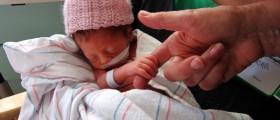
Overview of Down Syndrome
Down syndrome is a genetically inherited developmentaldisorder present right at birth. Down syndrome affects 1 in 800 live births inNorth America, and is characterized by additional genetic material passed on atconception. Individuals who do not suffer from genetic developmental disordersinherit 46 chromosomes, 23 from the mother and 23 from the father. Downsyndrome persons inherit either one whole additional chromosome 22 or some ofits genetic material, which leads to different intensities of the condition. Mostparents of Down syndrome persons do not have any symptoms and are just thecarriers for the condition. Further, many are unaware that they possessdefective genes as there are no signs. The reason why some individuals receiveextra genes is unknown but risk factors have been identified. Primarily, theage of the mother plays an important role in passing on Down syndrome. Theolder the woman is when she gets pregnant the higher the possibility of theincidence of the condition, especially over the age of 35. Although the exactcauses are unclear there are preventative measures that are available at mosthospitals with nurseries. Couples who are contemplating having children can getgenetic counseling and be screened for potential hereditary disorders forwhich they are carriers. Also, once the woman gets pregnant her doctor can runtests that determine whether the fetus is likely to suffer from Down syndrome,giving her the option to terminate the pregnancy or prepare for raising a childwith special needs.
Communicative Problems in Down Syndrome
The symptoms of Down syndrome are numerous and encompasseverything from physical and health anomalies to cognitive impairment. Althoughthe affected persons are able to read emotions better than people with similarcognitive abilities brought on by different developmental problems and thusengage in non verbal communication effectively, they have substantialdifficulties when it comes to speech. Learning to speak is one of the mostessential milestones that children reach as it is crucial for furtherdevelopment. Also, being able to communicate effectively increases the numberof instances of social interactions with peers. Without somewhat developedspeaking skills the child is unable to relate to parents, siblings, familymembers, or friends. Also, playing with other children is an important aspectof development and it is hindered by the inability to express needs, wishes,and thoughts verbally. Learning to speak is also closely linked to mental developments.The more words a child knows the more concepts he or she is familiar with. Therate at which children learn new words is directly proportionate to the rate ofacquiring knowledge. As the child builds the language skills the words becomethe instruments for putting thoughts together. In turn, the child begins tothink, reason, and remember. The inability to learn new words and translatethem into speech hinders most cognitive functions and makes further developmentvery challenging. In addition, speech problems also arise from the fact thatmost children with Down syndrome are hearing impaired and some are even borndeaf. Hearing problems affect more than 50 percent of the Down syndromepatients and they usually get progressively worse as the person ages. Middle earproblems are often the most common reason for hearing loss and they are broughton by excess liquid that is accumulated. Most affected persons also suffer fromtooth decay and dental problems, which also contribute to one’s ability to speakproperly. Tooth decay is caused by the increased amount of saliva which enablesthe bacteria to degenerate teeth and gums. In some instances, the personfinds daily activities, such as teeth brushing, a demanding task that is notperformed properly, which in turn contributes to poor oral health. Regardlessof how limited their potential might be compared to normally developing peers,if children with Down syndrome are placed in early intervention programs wherephysical, occupational, and speech therapy will be provided, they can reachtheir full potential and have increased sense of independence and self worth.
Big Tongue Issue with Down Syndrome
There are many physical symptoms of Down syndrome whichcause numerous problems for the affected individual, and one of them is a largerthan usual tongue. Both the lips and the tongue are so bulky that theyinterfere with the functions such as eating, drinking, and speaking. Low muscletone is one of the most prominent Down syndrome symptoms and as tongue is amuscle it is usually ineffective unless the child is engaged is exercises thatincrease the muscle tone and the tongue’s productivity. Activities such aslicking the food off a plate makes the muscle stronger and more able to performessential functions. Balancing a cheerio on the tip of the tongue is alsorecommended for children who are slightly older and able to attempt the task.Placing sticky foods such as honey at the corner of the child’s lips helpsimprove the lateral sub group of muscles in the tongue. Using straws to drinkdense liquids such as milk shakes or smoothies also makes the tongue stronger.

















Your thoughts on this
Loading...